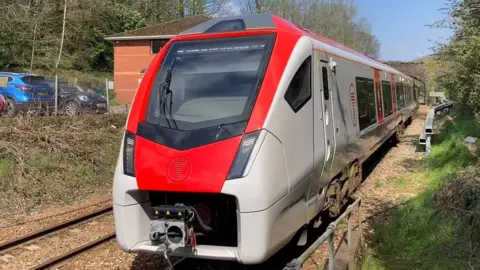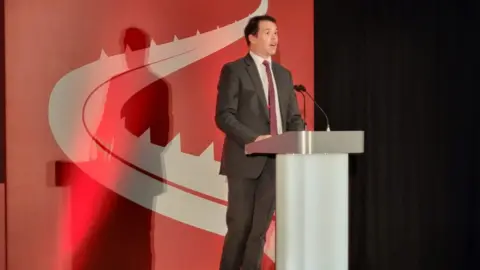Trains in Wales can be awful, says transport minister Lee Waters
 BBC
BBCWales' railway has been "pretty bleak for a while", the Labour politician in charge has admitted.
Lee Waters said that the experience of using the nationalised Transport for Wales (TfW) service could be "awful" with overcrowding and cancellations.
He said it will get better as the South Wales Metro work progresses, but suggested it was difficult to get the message across.
The transport minister spoke at a rail industry event in Cardiff on Thursday.
In the speech, he also accused counterparts in Westminster of planning for a "managed decline" in the Welsh railways.
The UK government said the comments were "wide of the mark".
Mr Waters told the Rail Cymru conference that he had been a regular rail user all his life.
"I experience first hand the frustrations that rail passengers have become all too familiar with," he said.

He said it can be "a little awkward" to bring up with other passengers that he is the transport minister.
"Because when your train is cancelled, or replaced by a bus, or overcrowded, you don't really want to hear of the £1bn Metro that's going to transform services in Cardiff and the valleys, or about the £800m investment in brand new trains that are running on the Rhymney line.
"That's not much comfort when a two-car 150 trundles up in Llanelli, already nearly full.
"Of course things will get better. But marketing melts in the face of the intensity of experience.
"You can't see the photos of overcrowding, or the awful experiences people report, without acknowledging that the day-to-day reality facing many rail passengers in Wales has been pretty bleak for a while."
"It will get better. But it's not better yet, and we should have the humility to acknowledge that."
Figures show a higher proportion of trains were cancelled in Wales last year, despite fewer running compared to the year before the pandemic.
In the year ending March 2022, 4% of TfW trains were cancelled compared to 3% two years before, while 67% of trains arrived within a minute of their due time.
The figures, from the Office of Rail Regulation, showed rail passenger journeys in Wales rose sharply compared to the pandemic-hit previous year - to 17.7m journeys - but were still 41% down on 2019-20.
'Managed decline'
The Metro programme to electrify the Valleys network will see the Treherbert line close for around ten months, while new trains are also now running on the Rhymney line.
While Transport for Wales is owned by the Welsh government, outside of the valley lines the rest of the Welsh network comes under the jurisdiction of UK ministers in London, via infrastructure bosdy Network Rail.
Mr Waters claimed that future Westminster investment plans amount to a "managed decline".
"Not only have they failed to invest in improving our network but they are now planning to worsen the performance of it."
He cited Network Rail's "control period" for 2024-2029, which he said "points to an increase in infrastructure failures and deteriorating assets which will result in speed restrictions, reduced reliability, more service failures, and either stagnant or worsening performance".
He said it would take the rail network 10 or 15 years to recover and did not blame Network Rail as it was "working to different, and very often conflicting, marching orders to the rest of the transport system in Wales".
A Department for Transport spokesman said: "These comments are wide of the mark - we're committed to improving services for rail passengers in Wales, investing a record-breaking £2bn in Welsh railways from April 2019 to March 2024."
They added that in 2020-21, the Office of Rail and Road said government funding of the railway was £2.04 per passenger mile in England and £3.85 per passenger mile in Wales and Scotland.
